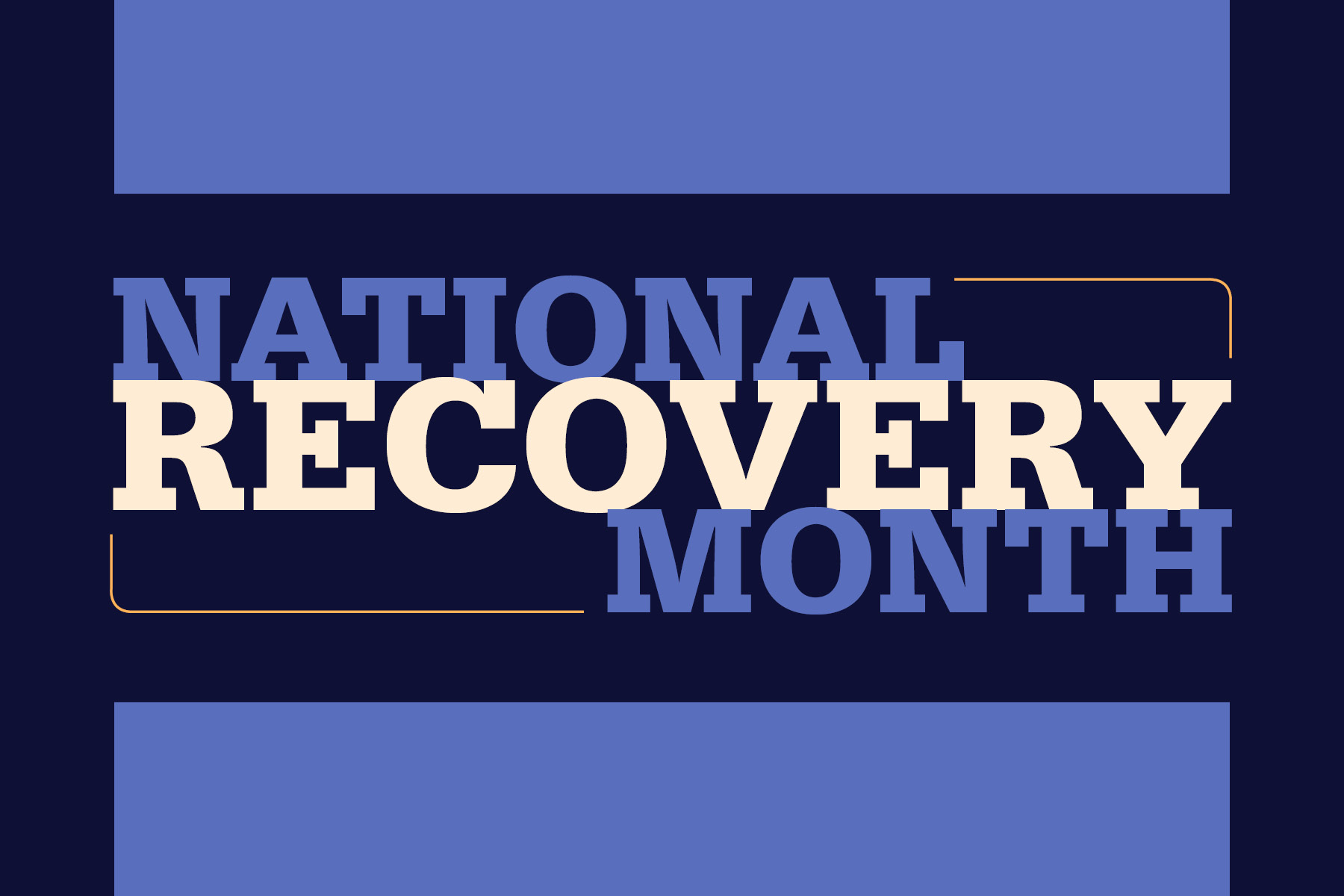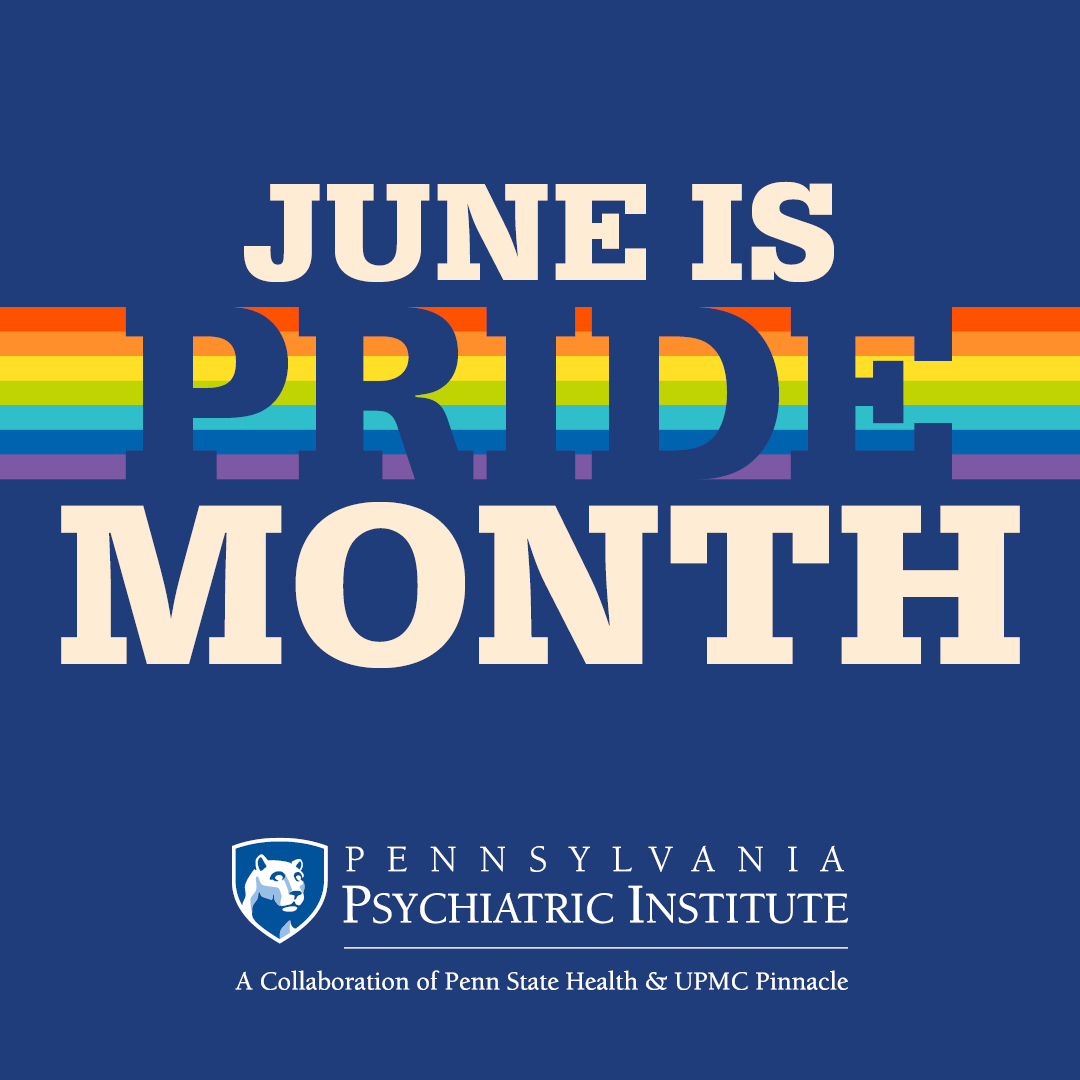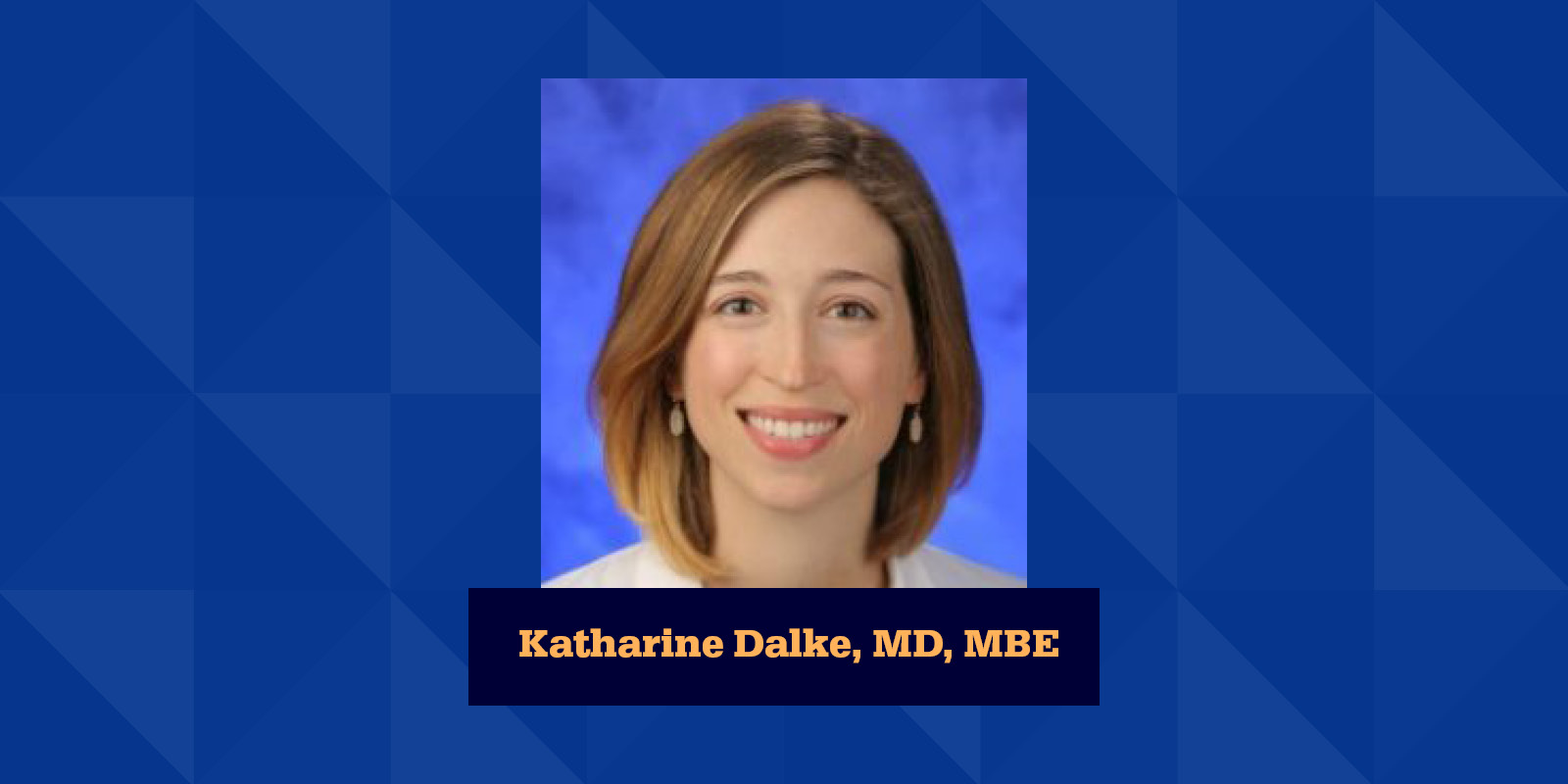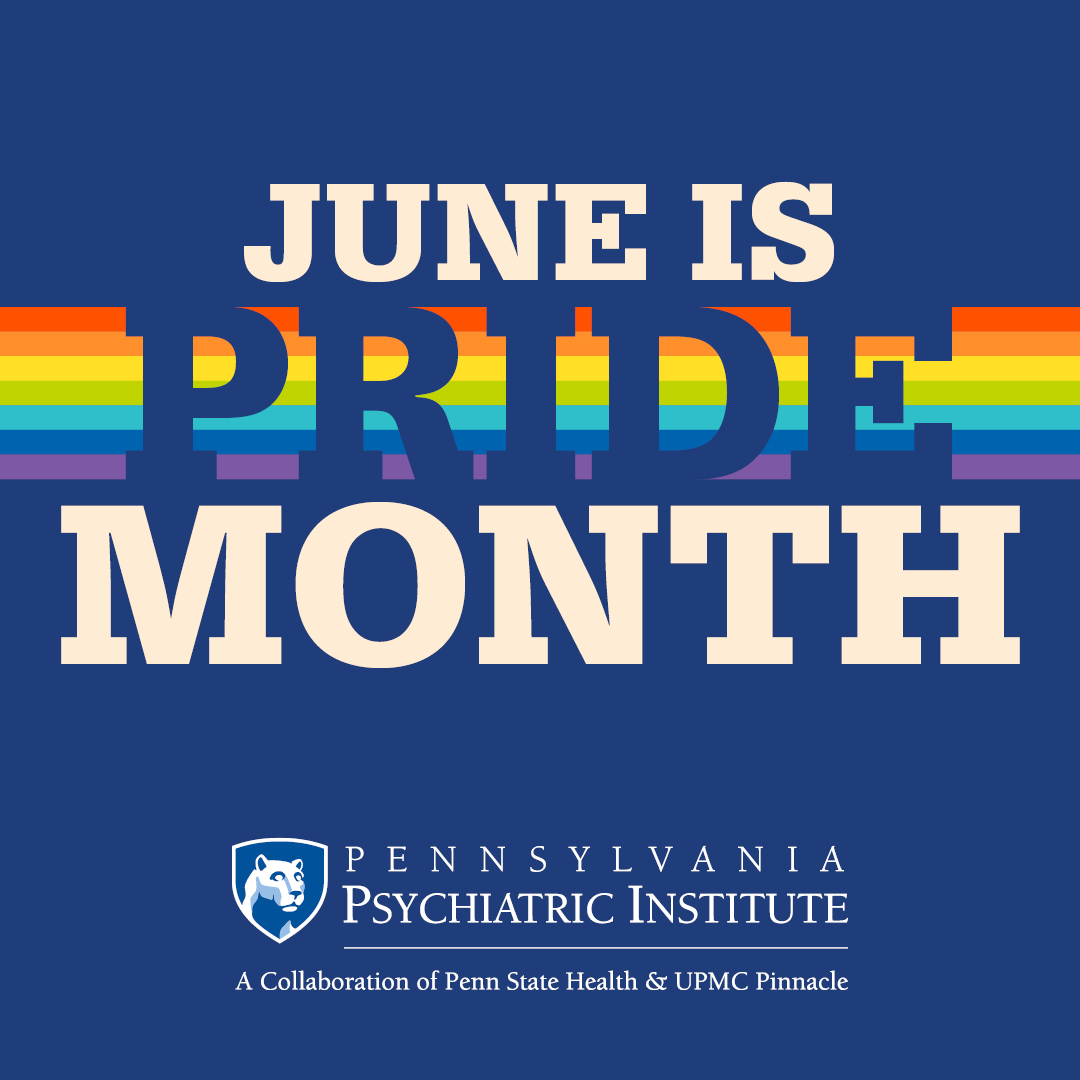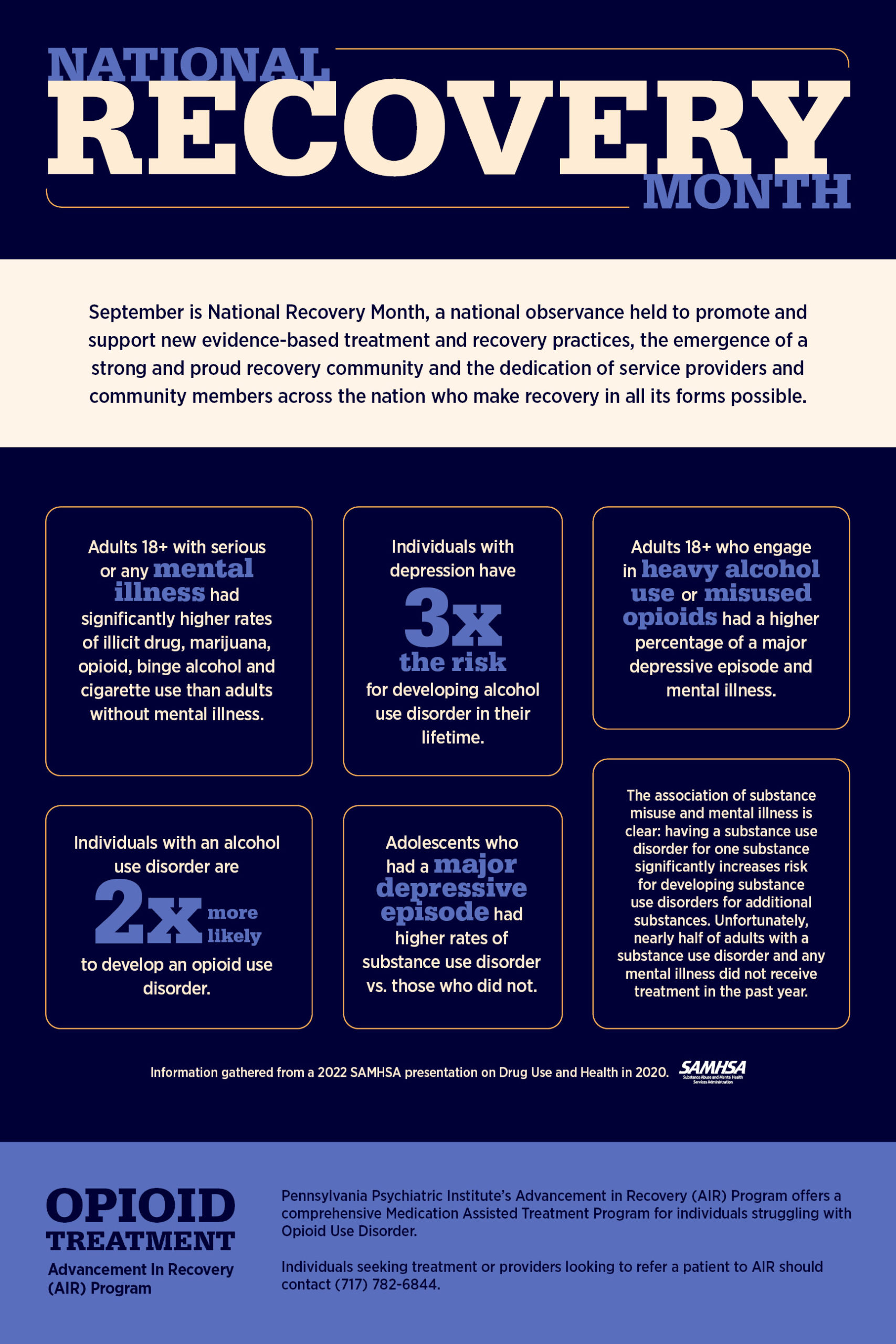
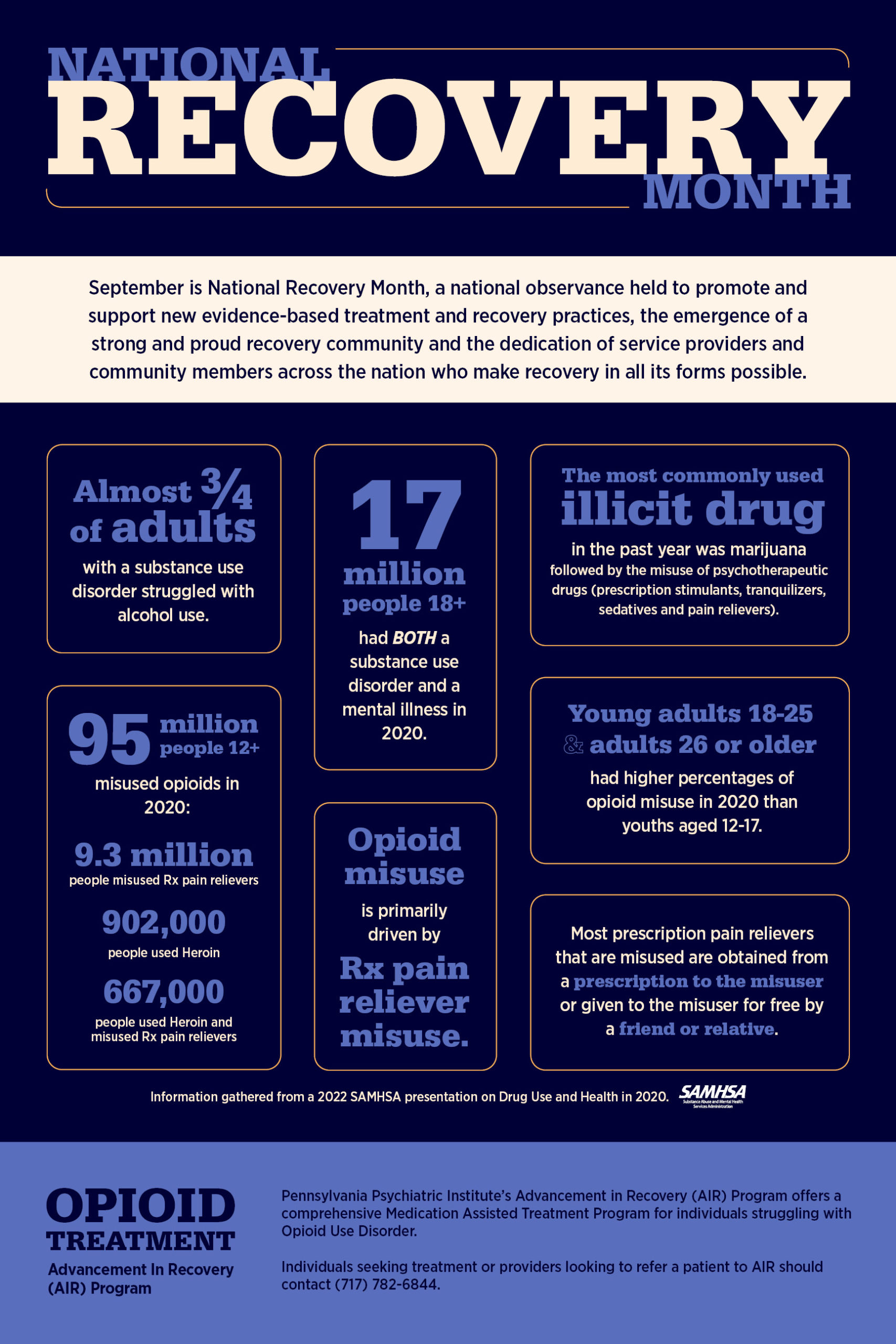
Archives: News Posts
Holds our news posts and news postspecific data
Supporting the LBGTQ Community
This month, PPI celebrates Pride. Pride is about people embracing who they are and coming together to show how far gay rights have come. Although awareness and support for the community continue to grow, members still face discrimination and mental health struggles. During June, we want to educate and encourage you to learn more about how you can be a better ally to the LGBTQ community and support this celebration of acceptance and love.
The LBGTQ+ community faces devastatingly high rates of mental illness, including elevated rates of depression, substance abuse and suicide. Reportedly, around 65% of people in the community experience harassment and discrimination as well.
Factors of stigma, rejection, discrimination, shame, and fear all play a role in the daily challenges those in the community face. Supporting a loved one, whether it’s a friend or a family member, goes a long way in building their confidence and showing that you fully accept them for who they are.
Here’s what you can do to support someone you love:
1. Consider Your Biases
Sometimes our biases can cause us to act in a discriminatory manner without being aware of it. Reflect on your own thoughts and perceptions and take a closer look at what you say or do. It is okay to make mistakes and ask questions, as it is part of your own learning process.
“We don’t have to understand something to support it. We can support our loved one while working to understand. There are lots of resources available to help educate us,” notes the lead provider of PPI’s LGBTQ Clinic, Katharine B Dalke, MD MBE. Some helpful resources are listed below.
2. Acknowledge Your Loved One’s Identity
Learning about your loved one’s sexual identity and orientation may come as a shock. Just by acknowledging, accepting and respecting, they’re already in a better head space. Avoid silence.
Dr. Dalke recommends: “Actively affirm your loved one by using their chosen name and pronouns. Using someone’s chosen pronouns can be lifesaving. Just by being a supportive presence you are helping them thrive and be safe.”
LGBTQ youth are the largest part of homeless youth in the US. A study found that transgender youth have lower suicide rates when people around them use their chosen pronouns and names.
3. Have their Back
“I see parents struggle with understanding what LGBTQ means to the person they love. They often fear that something bad will happen to them because of it. However, the single most important protective factor is a supportive and loving family and community. The data shows that supporting them and helping them move through the world safely is what helps them the most” explains Dr. Dalke.
Lessen the barriers that loved ones in the LGBTQ community face by: educating family members on their identity, being there as a support in the case of discrimination, advocating for diversity trainings in the workplace and calling out anti-LGBTQ words and actions when you encounter them.
4. Encourage a Healthy Social Life
Having an identity that does not fit into the “norm” can be isolating. Encourage loved ones to be a part of the social circle. Local or online LGBTQ organizations can provide opportunities to connect and make friends. Being a part of the conversation is great for their self-esteem and mental health.
Encourage them to be a part of non-LBGTQ social settings. Involvement in friend and family gatherings is just as important in obtaining full support. Dr. Dalke observes, “Sometimes we don’t ask them about things like crushes like we do for straight kids. Asking the loving and respectful questions you normally would affirms your loved one and shows them acceptance.”
5. Help Your Loved One Access Mental Health Treatment
Since your loved one is at an increased risk for mental health symptoms or illness, getting good treatment is helpful at any time.
Mental illness is an overwhelming feeling. Do some research on treatment options and help in choosing a therapist or treatment facility. LGBTQ patients are more likely to have access issues – they are less likely to have health insurance and are more likely to avoid mental health care because of previous bad experiences. If you can, provide solutions for financial support or other barriers in accessing treatment.
A sense of belonging is pivotal in making sure your loved one’s identity is fully supported and accepted by friends and family. Educate yourself, family members and friends, step in where necessary and advocate for their well-being. The more people they have on their side, the more comfortable they are in facing the stigma and other discriminatory acts.
“By providing your loved one with love, acceptance and affirmation, you are helping them to build resilience, strength and pride for who they are.”
The LGBTQ Clinic at PPI offers support to not only those who identify as LQBTQ+, but their families as well. You can learn more about the clinic in this article, or by calling (717) 782-6420.
Curious about learning more? Check out these references:
- 2020 PA LGBTQ Health Needs Assessment
- GLAAD Media Reference Guide – 11th Edition
- GLAAD Media Reference Guide – LGBTQ Terms
- org Resources on Personal Pronouns
- Home New (centralpalgbtcenter.org)
Sources:
5 Ways to Support Your LGBTQ Loved One’s Mental Health – Constellation Behavioral Health
6 Ways to Support the Mental Health of Your LGBTQ Loved Ones – Talkspace
PPI, an LGBTQ Ally – Dr Dalke Explains

PPI, an LGBTQ Ally – Dr. Dalke Explains
This month, Katharine Dalke, MD, MBE, celebrates 5 years at Pennsylvania Psychiatric Institute (PPI). She started her time at PPI in the inpatient unit, and moved to outpatient in 2019, where she worked in the dialectical behavioral therapy (DBT) program while building her own clinic for LGBTQ patients. Wearing several hats, she is also the Director of the Office for Culturally Responsive Health Care Education and an Assistant Professor of Psychiatry and Behavioral Health and Humanities at Penn State College of Medicine.
From the beginning, her goal was to build out the LGBTQ program at PPI. Though it took time to build over the years, next month, she will be able to fully transition to running the LGBTQ clinic. Dr. Dalke explains: “The LGBTQ clinic is an outpatient program where we help patients who identify as part of the LGBTQ community with mental health evaluation and treatment with a supportive and affirming care team.”
“I identify as queer and part of the LGBTQ community. Growing up I received mental health and medical care that felt traumatic from providers who had the perspective that being queer meant something went wrong with me. But I also had good experiences with providers and realized how powerful these good experiences could be. Good experiences help people feel good about themselves and live the lives they want. This became the driving force in my career path; I went to med school because I wanted to be a helpful, positive force in someone’s life.”
The year Dr. Dalke finished med school, a landmark report was published on LGBTQ health. Prior to that point, doctors were focused on the physical aspects of LGBTQ medical care – like HIV/AIDS, gender affirming hormones and surgery, and cancer – but the report found that the biggest issue for this community was mental health, with much higher rates of problems such as depression, PTSD, suicidal thoughts and eating disorders.
“I went into psychiatry training at a time when the field was appreciating in a better way the health disparities in the LGBTQ community. In addition to providing clinical care, I also want to help with LGBTQ education and systems advocacy. Patients interact with a network of people, each working to help them in a different way. My goal is to train providers on how to make care safer, more effective, and more affirming for LGBTQ+ people. If I can be part of training myself out of a job, that would be awesome!”
Dr. Dalke, true to her passion for education, keeps busy with her work. She leads a training each year for PPI staff as well as education efforts with Penn State Health, teaching medical students, residents, and most recently, leading a Project ECHO on LGBTQI+ inclusive care, for which 100 people are currently registered from across the region and to the UK.
At PPI, the LGBTQ clinic provides care to people dealing with:
- Distress associated with gender or sexuality. Though many people explore their gender and sexuality without problems, some people feel anxious, depressed, or overwhelmed. If a patient is struggling with their gender or sexuality, they can be referred to the clinic to talk with Dr. Dalke. She can talk help them pull apart the different aspects of their feelings to better understand and improve their mental health.
- Family members can also take advantage of the clinic to help them understand what their loved one is going through and how they can support them. “Many parents need support in order to support their child. This is why we also help families and loved ones. There is evidence that supportive families significantly lower the risk of suicide, poverty and self-harm for LGBTQ youth – that is more important than any prescription I can write” notes Dr. Dalke.
- Gender Affirmation. Transgender patients may need a mental health evaluation in order to access gender affirming treatments like hormones or surgery. Fortunately, this requirement is changing for adults, as only being able to receive gender-affirming care “because a shrink said it’s ok” puts power in the hands of the doctor, not the patient. When she meets with patients seeking gender affirmation, Dr. Dalke works to keep them in the driver’s seat, focusing on helping them feel confident in their decisions and doing what she can to advocate for their needs. For adolescents, this also means involving families when possible, as the consent of a parent or guardian is required for gender affirming medical treatment of minors.
- Mental health issues who happen to also be LGBTQ. Sometimes mental health problems don’t relate at all to a person’s sexual or gender identity, but the patient wants to see someone who is culturally responsive and will treat them respectfully.
- In these cases, Dr. Dalke coordinates care with and refers to other LGBTQ-competent providers for psychotherapy or medical treatment.
Dr. Dalke emphasizes that the majority of those who identify as LGBTQ do not have any mental health issues. Those that do are at an increased risk for depression, anxiety, trauma (from rejection, harassment, violence, and/or sexual violence), eating disorders, substance abuse, suicidal thoughts and PTSD.
In practice, these mental health issues look like a reaction to stress. Studies have shown that stress drives these risks, and that this stress is heavily related to the stigma that LGBTQ patients face. “You can think of it like discrimination and racism towards people of color,” explains Dr. Dalke. “When society says someone’s identity is wrong, it drives up their stress levels and affects their mental and physical health.”
“Currently at PPI we only see people individually, though I hope to develop group services one day. Whenever possible, we recommend excellent community support groups to our patients. As one of the only psychiatrists who focuses on this community outside of Philly and Pittsburgh, my schedule is limited to accommodate as many people as possible, so I generally meet with patients no more frequently than once monthly. This is why I make sure that my patients also have regular visits with their therapist.”
When asked about successes, Dr. Dalke was excited to note: “I’ve enjoyed a lot of successes! Some of these include seeing PPI’s interest in and ability to provide excellent care for LGBTQI+ patients grow hugely over the last several years. For example, we’ve worked with program leadership to ask every patient who comes for outpatient services about their chosen name, pronouns, sexual orientation, and gender identity. I’ve also observed tremendous growth in comfort and skill among our staff with this information. It’s also been hugely gratifying to walk alongside many patients long enough to really see them achieve their goals and move from crisis to recovery to thriving. That’s worth more than anything!”
Looking forward, Dr. Dalke plans to continue her efforts: “Expanding services is my number one goal for 2022. I hope to grow this clinic by hiring a therapist for our LGBTQ patients and to continue to expand capacity in the region for care.”
Curious about learning more? Check out these references:
- 2020 PA LGBTQ Health Needs Assessment
- GLAAD Media Reference Guide – 11th Edition
- GLAAD Media Reference Guide – LGBTQ Terms
- org Resources on Personal Pronouns
- Home New (centralpalgbtcenter.org)
Laverne Cox: Breaking Barriers as a Transgender
This month, PPI celebrates Pride. Pride is about people embracing who they are and coming together to show how far gay rights have come. Although awareness and support for the community continue to grow, members still face discrimination and mental health struggles. During June, we want to educate and encourage you to learn more about how you can be a better ally to the LGBTQ community and support this celebration of acceptance and love.
Third to be highlighted is Laverne Cox, Emmy-nominated American actress, star of the Netflix series Orange is the New Black and LGBT advocate.
She grew up in Mobile, AL where she started dance lessons at eight years old. Her childhood revolved around performing in dance recitals and talent shows, with the hopes of becoming famous on Broadway and in television and movies.
Throughout this point of her life, she was very feminine. She was bullied and taunted in school and was made fun of by other students.
In college, Cox started her medical transition and living and identifying as female. She performed in drag shows in the nightclub scene, so she could still fulfill her desire to perform.
Candis Cayne’s role in Dirty Sexy Money (2007), made her the first transgender actress to play a recurring transgender character in a primetime show. Cox didn’t think it was possible to be openly trans and have a career as an actress. Once the movie premiered, she sent a postcard with her contact information to a list of about 500 agents and casting directors.
Sophia Burset is Cox’s most groundbreaking role in the critically acclaimed Netflix original series Orange is the New Black. Her attention was brought to diverse audiences around the world. This role led to her becoming the first openly transgender actress to be nominated for an acting Emmy and the first transgender woman of color to have a leading role on a mainstream scripted tv series.
Cox is also the first transgender woman to appear on the covers of TIME Magazine, British Vogue, Cosmopolitan Magazine, and Essence Magazine.
In 2020, she produced an Emmy-winning Netflix documentary, Disclosure, a film that takes an eye-opening look at transgender depictions in film and television.
Laverne inspired a world of people in developing an understanding of what transgender means and the issues they face. She will be honored this year for her advocacy work at this year’s Webby Awards.
The awards, presented yearly by the International Academy of Digital Arts and Sciences, or IADAS, are often described as the “internet’s highest honor” and they celebrate excellence of all things internet.
“Laverne Cox’s body of work in advocacy is as long and celebrated as her performances on screen. She has worked tirelessly championing for awareness and civil rights, so it is our honor to recognize her as Webby Advocate of the Year,” organizers said in a news release.

Laverne Cox Credit: Biography.com
Sources:
https://time.com/135480/transgender-tipping-point/
https://www.nydailynews.com/ny-laverne-cox-honored-advocate-of-year
Barbara Gittings: Mother of the LGBT Civil Rights Movement
This month, PPI celebrates Pride. Pride is about people embracing who they are and coming together to show how far gay rights have come. Although awareness and support for the community continue to grow, members still face discrimination and mental health struggles. During June, we want to educate and encourage you to learn more about how you can be a better ally to the LGBTQ community and support this celebration of acceptance and love.
Second to be highlighted is Barbara Gittings, a gay rights activist and widely regarded as the mother of the LGBT civil rights movement. Gittings was born in Vienna, Austria, in 1932.
In 1958, while commuting from Philadelphia, she started the New York chapter of the Daughters of Bilitis (DOB). This was the nation’s first lesbian civil rights organization in the United States.
Gittings enlisted activists from New York, Washington, D.C. and Philadelphia for the first public demonstrations for gay and lesbian equality. From 1965 to 1969, in front of Independence Hall every July 4th, protests known as Annual Reminders paved the way for the Stonewall riot in 1969.
In 1970, a march commemorated the first anniversary of the Stonewall – from Greenwich Village to Central Park. It was remembered as the first New York City Pride Parade.
Gittings edited the Ladder, a lesbian periodical published by the DOB. In the 1964 issue, her editorial blasted a medical report that described homosexuality as a disease, that treated lesbians more like “curious specimens” than as humans. She went on to stop the American Psychiatric Association from classifying homosexuality as a mental disorder.
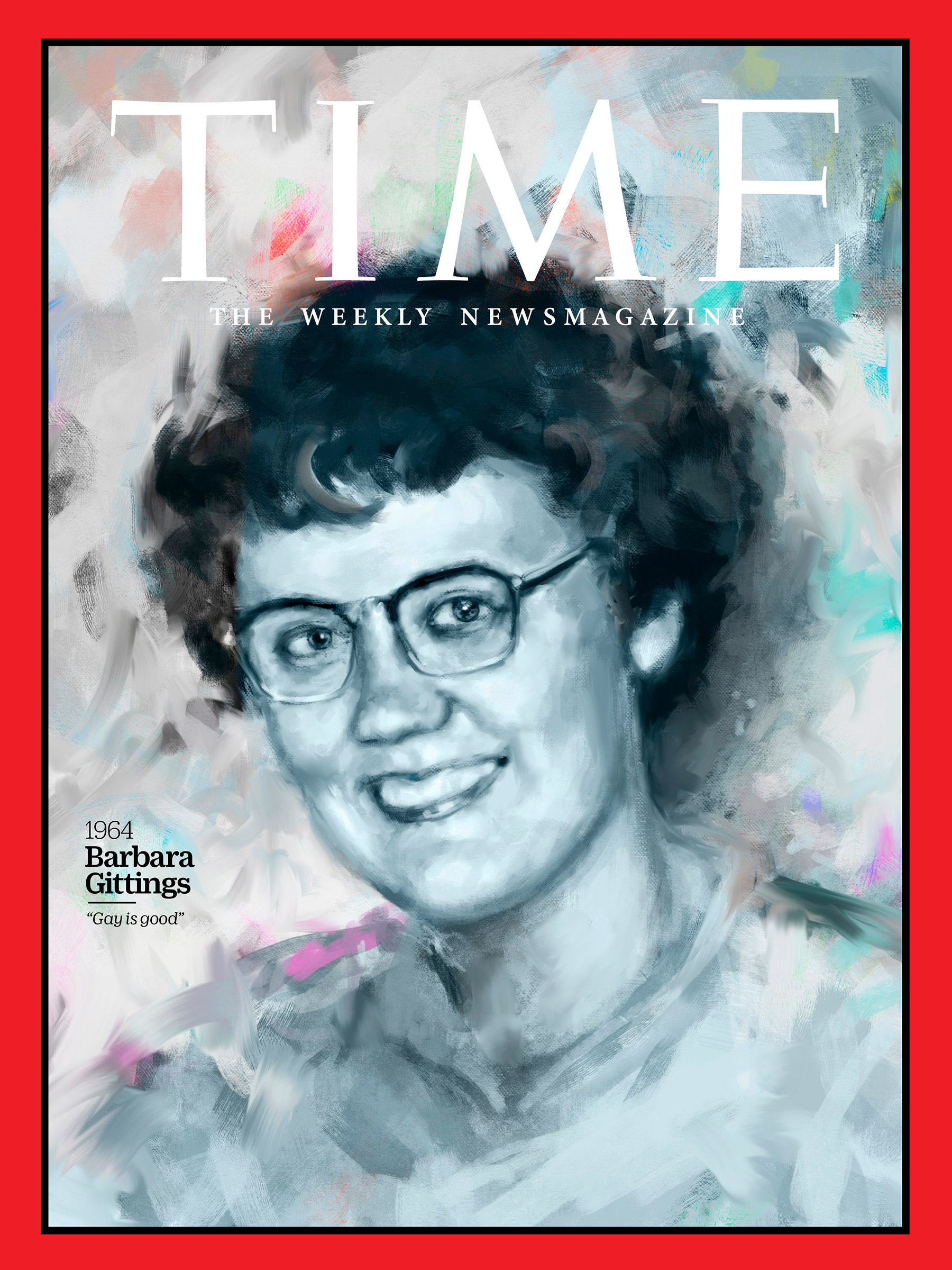
Barbara Gittings Credit: TIME Magazine
In 1973, the APA announced its removal of the classification of homosexuality as a mental disorder. With their retraction, the gay rights movement was no longer burdened by the label and its consequences.
From then on, she promoted gay literature and eliminated gay discrimination in the nation’s libraries. She worked closely with the Gay Task Force of the American Library Association and edited their bibliography about gay men and lesbians. In 2001, The Free Library of Philadelphia named the “Gittings Collection” of gay and lesbian materials at its Independence Branch.
In 2012, Philadelphia City Council approved a designated block in the heart of the city’s gayborhood “Barbara Gittings Way.”
Barbara died of breast cancer at age 74. Her numerous awards and recognition carried on her legacy of monumental changes in the gay rights movement.
Sources:
https://lgbt50.org/barbara-gittings
https://time.com/5793614/barbara-gittings-100-women-of-the-year/
https://www.nytimes.com/2007/03/15/obituaries/15gittings.html
Karl Ulrichs: Speaking Out on Homosexuality
This month, PPI celebrates Pride. Pride is about people embracing who they are and coming together to show how far gay rights have come. Although awareness and support for the community continue to grow, members still face discrimination and mental health struggles. During June, we want to educate and encourage you to learn more about how you can be a better ally to the LGBTQ community and support this celebration of acceptance and love.
First to be highlighted is Karl Heinrich Ulrichs, a gay rights activist, lawyer and writer. He was born in 1825, in Hanover, Germany.

His experiences with homosexuality started early on. As a child, he gravitated towards clothing that were deemed feminine by his culture. At 14, he was sexually abused by a riding instructor, something that would remain with him throughout his life.
When he began his career in law, he became aware of his identity and attraction to men. In 1857, his self-awareness led to his dismissal from his job as a legal adviser for the district court of Hildesheim. This led to him becoming more comfortable and vocal about his sexual orientation.
He told his family and friends that he was in his own words, an “Urning” – a term he coined to describe a gay man. In Ulrichs’ lifetime, he refused to use the word ‘homosexual’ when it was discovered. He resented that “sexual” was a part of the word at all and that it should be seen beyond sexual acts.
Ulrichs concluded that love between two men was natural, and something people were born with. His theory was that men were attracted to men being born with a “germ” that made them internally feminine. As he learned about different types of attraction between males and females, his theory expanded. This laid the groundwork for an argument of fair treatment among homosexual identities.
In August 1867, he became the first homosexual person to publicly speak in defense of homosexuality. Despite his multiple arrests, he addressed to Congress of German jurists to repeal anti-homosexual laws.
Although he fought German politics unsuccessfully for years, he reflected, “Until my dying day I will look back with pride that I found the courage to come face to face in battle against the specter which for time immemorial has been injecting poison into me and into men of my nature… I am proud, that I found the courage to deal with the initial blow to the hydra of public attempt.”
Urlichs died in 1895, but his revolutionary efforts helped push the gay rights movement into the spotlight.
Sources:
https://legacyprojectchicago.org/person/karl-ulrichs
https://www.makingqueerhistory.com/articles/2018/3/13/karl-hinreich-ulrichs
From Silence to Recovery: NAMI Members of the Black Community Speak Out
Advocates and experts share their stories and speak their truths about mental health issues in the Black community.
From the trauma of racism to the alarming increase in suicide among Black youth and the stigma that stands in the way of life-saving mental health awareness and support, these messengers of hope are raising their voices to help individuals, families and their loved ones find help and community.
In collaboration with Dauphin County NAMI. For more info visit: nami-dauphincounty.org.
A Mother’s Vow Of Mental Health Advocacy For Her Daughter
When Joseline Castanos’ daughter was hospitalized for a suicide attempt, she vowed to fight for her and find the right care. Two of the biggest barriers she faced were the stigma surrounding mental health in the Hispanic/Latinx community, and the scarcity of culturally competent care.
Through NAMI, she found a safe place, support for her daughter and a platform to continue advocating for mental health in her community.
In collaboration with Dauphin County NAMI. For more info visit: nami-dauphincounty.org.
Collecting Hats & Crushing Stigma in the Asian-American Community
Nao Gamo is a neuroscientist and entrepreneur who speaks about living with bipolar disorder. While experiencing an episode of mania, she ended up accumulating an expansive collection of hats. Her experience led to her wanting to educate about how mental illness can manifest uniquely in people and that there is nothing to be ashamed of, particularly within the AAPI community.
In collaboration with Dauphin County NAMI. For more info visit: nami-dauphincounty.org.
A Mental Health Crisis Deserves a Mental Health Response
NAMI is working to change the way mental health and suicide crises are handled in the U.S. This short clip introduces 988, a new 3-digit number, available 24/7 in every community by Summer 2022. This crisis response system is geared to help anyone in crisis and reduce law enforcement involvement.
In collaboration with Dauphin County NAMI. For more info visit: nami-dauphincounty.org.

